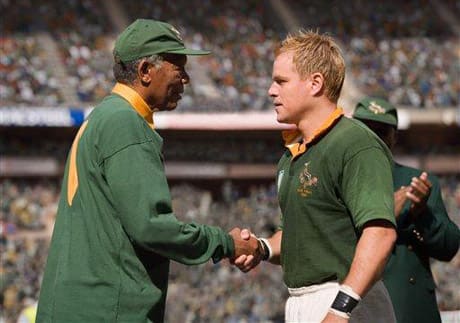In 1995, South African President Nelson Mandela joined forces with the captain of South Africa's rugby team to help unite their racially divided country. Mandela, who had served nearly 20 years of his life in prison as the leader of the dissident movement that battled Apartheid, had just been elected. In a calculated move, he rallies the black majority to support the hated Springboks, the national rugby team that symbolizes everything white and racist. After all, South Africa would be hosting the Rugby World Cup in 1995. Blacks cheering the Springboks would mark a big step in reconciling the torn nation.
Clint Eastwood brings this story to the big screen, but fails to plumb its inherent drama. First, there's remarkably little conflict to propel this film forward over the course of two hours. It takes a long time to set up the story then fails to flesh out Mandela and Springboks' captain, Francois Pienaar, played by Morgan Freeman and Matt Damon, respectively. Mandela is a hero, noble and charming. Pienaar is dutiful and forthright. But what else is there? They never come to life as flesh-and-blood creatures with contradictions or character arcs. They feel flat.
South Africa is one of the most violent places on Earth, with more guns per capita than the United States, suffering violent class disparity between the black townships, where families live in corrugated cardboard shacks, and the affluent whites, who reside in gated suburbs. This post-Apartheid South Africa is too sunny and clean. The film feels bloodless.
Invictus is not a failure, however. Freeman and Damon deliver strong performances despite their thin characters, and it's hard to denigrate the film's noble intentions. However, the movie suffers from political correctness, Hollywood sweetness and a predictable outcome. The great, mythic Mandela film has yet to be made.
(Warner)Clint Eastwood brings this story to the big screen, but fails to plumb its inherent drama. First, there's remarkably little conflict to propel this film forward over the course of two hours. It takes a long time to set up the story then fails to flesh out Mandela and Springboks' captain, Francois Pienaar, played by Morgan Freeman and Matt Damon, respectively. Mandela is a hero, noble and charming. Pienaar is dutiful and forthright. But what else is there? They never come to life as flesh-and-blood creatures with contradictions or character arcs. They feel flat.
South Africa is one of the most violent places on Earth, with more guns per capita than the United States, suffering violent class disparity between the black townships, where families live in corrugated cardboard shacks, and the affluent whites, who reside in gated suburbs. This post-Apartheid South Africa is too sunny and clean. The film feels bloodless.
Invictus is not a failure, however. Freeman and Damon deliver strong performances despite their thin characters, and it's hard to denigrate the film's noble intentions. However, the movie suffers from political correctness, Hollywood sweetness and a predictable outcome. The great, mythic Mandela film has yet to be made.
